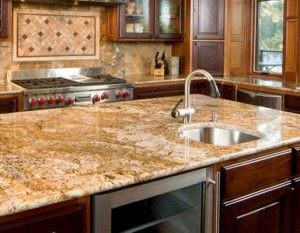In a recent Houzz survey, homeowners were asked a series of questions about their kitchen remodeling plans. Out of the 7,812 people who responded, 94 percent said they plan to replace their countertops — and almost 90% of those 7,343 people said they would choose either granite or quartz. Half of those 6,608 people will choose granite as the replacement, followed by 36 percent who said they would choose quartz. Let’s take a look at the granite vs. quartz project options to find out which one you might want to consider for your kitchen project. Granite is natural stone, mined from the ground in large blocks to be cut into individual slabs.
Granite vs. Quartz Project Options
Amy Stone
Quartz is a manufactured material containing crushed quartz mixed with resin and coloring in a ratio of 93% quartz to 7% resin and colors. Some people like the look of granite more than quartz because it has a natural earthy aspect to it. Others prefer the sleek uniform look of quartz. The great news is that you can never go wrong by choosing either one!

About Granite
- Natural stone is not designed by nature with consistent color and patterns. For some this will be a benefit while others will consider it to be a drawback.
- Granite is porous stone and granite countertops need to be sealed before they are used and resealed every year thereafter to be considered stain-resistant.
- Seaming is difficult to hide.
- For regular day-to-day activities and proper maintenance, this is a countertop that can last for a lifetime and beyond.
- Most granite is probably going to cost you a little more than quartz.
- The status symbol effect of a natural stone countertop still attracts some homebuyers.

About Quartz
- Quartz countertops are just as strong as granite but have the added benefit of being more flexible, making them easier to fabricate and install.
- Quartz is non-porous and never requires sealing.
- Quartz offers a virtually no-maintenance material solution for countertops.
- Quartz seams are less visible than in granite, especially when using darker colors.
- Quartz materials generally leave less of a carbon footprint than granite.
- Younger homeowners put more value on individuality and are often looking at new ideas for countertops.
After considering the advantages and disadvantages of both options the answer can be found by considering which of them fits into your budget and highlights the mood and ambiance you are trying to create in your kitchen. To explore the colors and patterns of NUSTONE QUARTZ for your project check out our sample chips. Then call your designer or fabricator and ask for NUSTONE QUARTZ.
